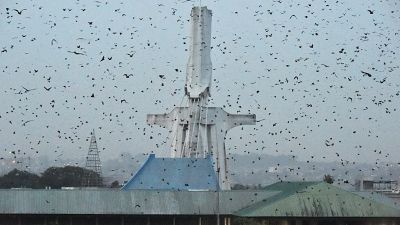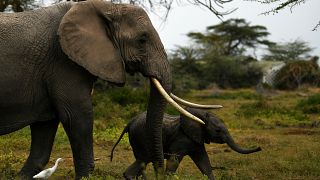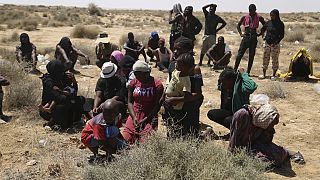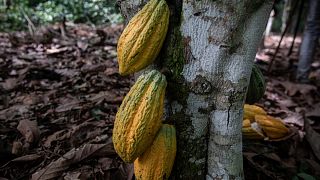Ivory Coast
Every day at dusk, the sky of the Plateau district is covered by a cloud of bats that fly squawking in their tens of thousands between the buildings of the business district of Abidjan.
An emblematic scene of the Ivorian economic capital could disappear because the small mammals are threatened.
"After having slept all day long clinging to the branches of the majestic trees which border the avenues of the Plateau, the bats soar, sometimes with their young under their wings, towards the Banco park, a primary forest classified as a natural park at one point about ten kilometers of flight, where they will feed all night long on insects, fruits and flowers ", says Magloire Niamien, biologist and specialist in bats from Abidjan.
They suddenly darken the sky and the sound of their cries and their flapping of wings almost covers that of the traffic.
Magloire Niamien, who wrote a thesis on bats, estimates their population was at one million fifteen years ago.
"It has drastically decreased," he says.
The reason is blamed on the felling of trees due to rampant urbanization and poaching.
But as there are no recent studies on bat populations, it is difficult to quantify the losses.
The mulched bat (the most numerous species in Plateau) is now considered "near-threatened" by the International Union for the Conservation of Nature, says Niamien.
"Up to half of the bat population has migrated elsewhere," says Professor Inza Koné, director of the Swiss Center for Scientific Research in Ivory Coast, who has also worked on this subject.
The cohabitation between the population and the bats is sometimes difficult: they are accused of making too much noise with their shrill cries, even in broad daylight, of defiling passers-by and cars by defecating.
"There have been petitions to demand action from the authorities, trees are cut down voluntarily to make them leave," says biologist Blaise Kadjo, a specialist in mammals and professor at Felix Houphouët-Boigny University in Abidjan.
A difficult cohabitation
People are also afraid of zoonoses (diseases that are transmitted from animals to humans) because bats are known to harbor many pathogens, especially viruses.
"There was a big fear during the Ebola epidemic in West Africa in 2014, and fears resurfaced with the coronavirus pandemic. But we have never recorded a public health problem with the Plateau bats. We carried out tests in 2014 without finding any trace of Ebola," explains Professor Kadjo.
Fear of disease does not prevent "bushmeat" enthusiasts from eating bats.
At the Siporex market, in the large popular commune of Yopougon in Abidjan, three smoked bats are sold for 2,500 CFA (less than 4 euros), which are then prepared by boiling them whole in a soup or a sauce.
Plateau bat hunting is mostly done on weekends when the area that mainly houses offices or schools is empty and poachers can operate in peace.
Important ecological role
Scientists are urging authorities to act to protect bats. Because, in addition to their ancient presence and their status as a symbol of Plateau, bats play an ecological role in fertilizing many plants.
"They eat a lot of fruit, swallow the seeds and then defecate them while flying, thus allowing dissemination," explains Professor Kone. "They also eat flowers, spreading pollen from flower to flower," like bees.
"Bats are one of the few animals capable of ensuring the reproduction of iroko, a tree sold around the world to make luxury furniture, and threatened by over-logging in West Africa," says Niamien.
"Their role is essential in maintaining the natural ecosystem," assures Blaise Kadjo, who, along with his colleagues, hopes for public funding to continue studies on bats and raise public awareness of their ecological importance.













Go to video
Bonobos in Congo form girl groups to fend off male aggression, study says
Go to video
84% of world's coral reefs affected by worst coral bleaching event in history
01:00
Tidjane Thiam removed from electoral list ahead of presidential election
02:19
In Ghana, an illegal settlement turned a forest reserve into a criminal city
Go to video
Tidjane Thiam nominated to run in Ivory Coast presidential election
Go to video
Kenya: Belgian nationals plead guilty to smuggling protected ants